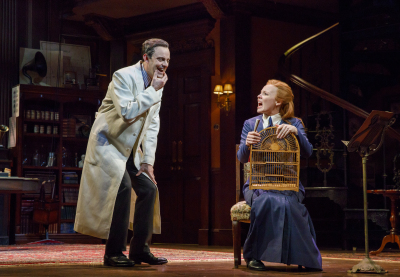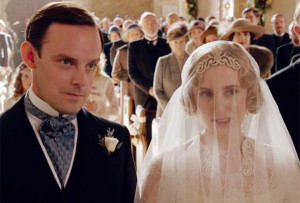Harry Hadden-Paton Brings Henry Higgins Into New Century; Talks ‘Downton Abbey’ Movie – Tony Awards Watch
June 6, 2018Harry Hadden-Paton Brings Henry Higgins Into New Century; Talks ‘Downton Abbey’ Movie – Tony Awards Watch
When Harry Hadden-Paton was informed by his agent that he’d been asked to audition for the Lincoln Center Theater production of My Fair Lady, his first response thought was Freddy Eynsford-Hill, the lovesick young swain smitten with flower girl Eliza Doolittle. Told they were interested in him for the leading – and older – character, Professor Henry Higgins, Hadden-Paton’s next question was, Will I have to wear a cardigan?
Related
Bruce Springsteen Set To Rock Tony Awards Sunday
“Because, ultimately, I know they’re just going to go for what they always go for,” he remembers thinking. Assured by his agent that this Higgins was to be something different, something younger than the usual Higgins – Hadden-Paton doesn’t say it, but he’d be entirely justified in hoping for something less Rex Harrison – the 37-year-old London-born actor took a shot.
“And I’m very glad I did,” he says.
Tony-nominated for Best Actor in a Musical, Hadden-Paton portrays a Higgins that somehow seems more modern than we’re used to without softening any of the prickly, sexist arrogance required to authentically deliver “A Hymn to Him,” with its famously men-are-from-Mars line lament, Why can’t a woman be more like a man? Paired with Lauren Ambrose’s fierce Eliza, Hadden-Paton, under the unsparing direction of Bartlett Sher (South Pacific, the upcoming To Kill a Mockingbird), brings the 1956 Lerner & Loewe musical kicking and singing into the 21st Century.
Hadden-Paton, who played The Crown‘s Martin Charteris, is perhaps best known to American audiences as Downton Abbey‘s castle-owning, Lady Edith-besotted Bertie Pelham. In this interview, Hadden-Paton, living with his wife, the actress Rebecca Night, and their two daughters in New York City for the first time, addressed the possibility of a Downton reunion – read on for his answer – as well as his approach to the redoubtable Higgins and his take on the doubly redoubtable Rex Harrison.
This interview has been edited and condensed for length and clarity.
Deadline: I can certainly imagine why the producers wanted a Henry and Eliza who were closer in age than we’re used to seeing in My Fair Lady, but tell me what your take on their thinking was.
Harry Hadden-Paton: It was very much what [director] Bart [Sher] wanted, and actually, as it happens, what Bernard Shaw wanted. The description in the original play text is that he’s 40ish, which is a little older than me. Henry’s definitely not meant to be an elder statesman, and Bart, in this current climate, wanted Henry and Eliza to start as equals. It adds a crackle of chemistry, and it gets rid of the awkwardness of the powerful older man and the vulnerable young woman. What we’re going back to is absolutely the text and what Bernard Shaw intended.
We have images in our head of Higgins as a puppeteer, but that’s not what Bernard Shaw wrote. Eliza turns up at Henry’s door, which must have taken considerable bravery and fortitude for her, and with the few earnings she had she asks him to teach her how to speak properly so that she could better her own experience of life. So that’s what it is, and that’s what we’re serving up. I think in the past, that got a little bit muddied, but Bernard Shaw was so forward thinking.
Deadline: What other ways did you and Lauren Ambrose calibrate your performances to give us a sense of equality between the characters? Or am I making an assumption about your intentions?
Hadden-Paton: No, no, no – we were absolutely aware of it. You know, I have some horrific lines that I have to deliver that, I have to say, are easier say in context than they are out of context.
Deadline: Even in context, there’s some pretty tough lines. Why can’t a woman be more like a man?

Hadden-Paton: Yes, even in context, there are some tough line. What’s wonderful is both characters have these journeys to go on, and in order for Henry’s journey of sort of self-realization, it’s an upheaval of everything he believes and has learned through his upbringing. Everything he believes has been turned on its head. In order for that to happen, I have to go quite strongly into the bigoted, patriarchal side of him first, so there was no shying away from it in my head. It’s what’s written, it’s what Shaw intended, but there is at least a change in him. Henry’s a flawed man, and these flawed characters are sometimes ones we can empathize with at the end.
But in terms of the production, we changed very, very little of the dialogue. We borrowed a few bits from the 1938 film Pygmalion.
Deadline: How do you go about approaching a line that you know could bring some boos?
Hadden-Paton: We had a little bit of discussion about the line “Where the devil are my slippers” – my final line – because there’s such a fear about it and a concern about it, and I think that’s because it’s…well, I think because of the portrayals that have been done in the past and the sort of literal reading of the line that gets people worried.
For me, I’d seen the film, but I didn’t [re-watch] it and research. I didn’t draw on any previous performances to help me with my understanding of it, and what I took from the ending was that here was a man who didn’t deal well with emotions, as we’ve learned through the entire thing. He doesn’t necessarily understand emotions and other people’s emotions, and he’s driven by one thing, which is a passion for language. Earlier on, Eliza describes what she wants from Henry, she wants a little kindness, and his response to that is, Yes, of course, that’s just how I feel, but he cannot talk about emotions, about feelings. So this ending, when she turns up and she says, “I washed my hands and feet before I come, I did,” which refers to one of her lines at the beginning, Henry is unsure of what he can say, and without being able to say any of the things he’s probably got going round in his head, he just mirrors her [with a callback to his own earlier line] and says, “Where the devil are my slippers?”
Deadline: It’s been a long while since I saw the movie, but if I remember correctly, you don’t get the sense that Rex Harrison’s Henry has grown much.
Hadden-Paton: I’m afraid he doesn’t go on much of a journey.
You know, in previous versions of the play, the ending wasn’t, “Where the devil are my slippers,” it was something like, “Oh, where are my reindeer skin gloves?” It was something so hyperbolic that it could not ever be interpreted as meant to be literal. So, that’s what I mean by going back to the original. We really wanted [to honor] what Bernard Shaw intended, and I think other people’s portrayals have maybe muddied people’s memory of it.
Deadline: What kind of reaction have you been getting from New York audiences? Any boos?
Hadden-Paton: Well, from the first preview, it was wonderful. I mean the reaction has been amazing. In the early days, as we calibrating and working out just how vile I can manage to be and still win the audience back at the end, there was the odd boo – and the odd cheer when Eliza walks out – but I think now it’s sort of firmly in place, and the overall reaction has been amazing. I’m afraid I don’t look at reviews or anything like that, but you get an immediate sense from the audience that they’ve had a lovely evening. And that’s really gratifying because there are two hundred odd people at the Lincoln Center Theater who have worked really hard on this collaboration, and I’m really glad that people are leaving inspired and entertained and refreshed from it all.
Deadline: In fact it was just announced today that there’s going to be a national tour starting in the fall.
Hadden-Paton: They haven’t asked me. [Laughs]
Deadline: Well, that’s good news, right? You’re going to be with the show in New York. What are your plans after that?
Hadden-Paton: I’m here for the rest of the year definitely, and I have an empty diary from then on. This whole process has left me with the importance of just staying open to opportunities, open to new ideas, and that’s what I’m doing. My family and I are having a wonderful time in New York. We love it here, and if we stay I think we’d all be very happy, but we’re at an age with our kids where we can follow the wind for a couple of years anyway, and we’re keen to do that and do My Fair Lady for as long as it feels right, I think.

‘Downton’: Hadden-Paton, Laura Carmichael
Deadline: So what you’re telling me is there’s no Downton Abby movie coming up in the next six months?
Hadden-Paton: There is talk of it. I think it’s a logistical difficulty getting everyone to do it. I’m hoping it might happen, but nothing concrete at the moment.
